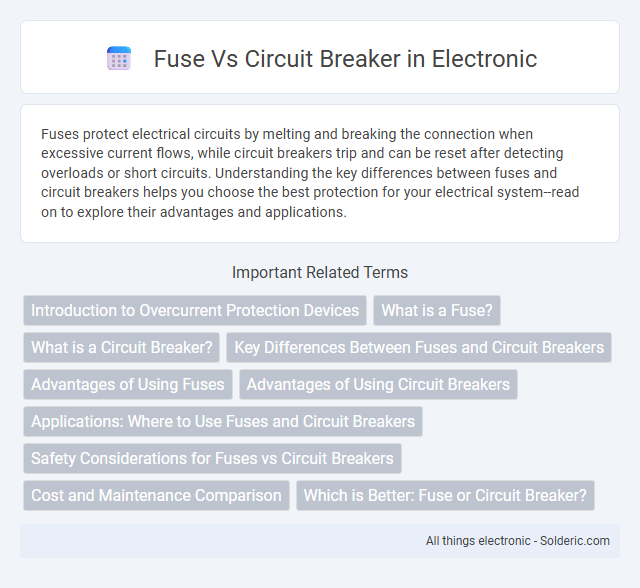Fuses protect electrical circuits by melting and breaking the connection when excessive current flows, while circuit breakers trip and can be reset after detecting overloads or short circuits. Understanding the key differences between fuses and circuit breakers helps you choose the best protection for your electrical system--read on to explore their advantages and applications.
Comparison Table
| Feature | Fuse | Circuit Breaker |
|---|---|---|
| Function | Protects electrical circuits by melting when current exceeds safe levels | Protects electrical circuits by automatically switching off during overload or short circuit |
| Reusability | Single-use; must be replaced after activation | Reusable; can be reset after tripping |
| Response Time | Fast response to short circuits | Generally slower than fuses but reliable |
| Cost | Low initial cost | Higher initial cost but cost-effective long term |
| Maintenance | No maintenance, replacement needed after a fault | Requires occasional testing and maintenance |
| Application | Used primarily in low-cost, simple circuits | Used in residential, commercial, and industrial systems |
| Safety | Less safe; risk of fire if replaced incorrectly | Safer; provides visible indication when tripped |
Introduction to Overcurrent Protection Devices
Overcurrent protection devices such as fuses and circuit breakers play a crucial role in electrical safety by preventing excessive current flow that can damage equipment or cause fires. Fuses consist of a metal wire that melts when current exceeds a certain threshold, interrupting the circuit instantly. Circuit breakers, on the other hand, use an internal switch mechanism to break the circuit and can be reset without replacement, providing reusable overcurrent protection.
What is a Fuse?
A fuse is an electrical safety device designed to protect circuits from overcurrent by melting its internal metal wire when the current exceeds a specific threshold, effectively interrupting the flow of electricity. It operates as a one-time use component that must be replaced after it blows, ensuring that electrical equipment and wiring are safeguarded against damage from short circuits or overloads. Commonly used in residential and industrial applications, fuses provide a simple and reliable method of circuit protection with fast response times to electrical faults.
What is a Circuit Breaker?
A circuit breaker is an electrical safety device designed to automatically interrupt the flow of current in a circuit when it detects an overload or short circuit, preventing damage and potential fire hazards. Unlike a fuse, which must be replaced after use, a circuit breaker can be reset and reused multiple times, providing convenience and cost-effectiveness. Circuit breakers are commonly used in residential, commercial, and industrial electrical systems for reliable protection and fault isolation.
Key Differences Between Fuses and Circuit Breakers
Fuses are single-use safety devices that melt when electrical current exceeds a specific rating, interrupting the circuit, whereas circuit breakers are reusable switches that automatically trip and can be reset after an overload or short circuit. Fuses generally respond faster to overcurrent conditions but require replacement once blown, while circuit breakers provide more convenience and can handle higher fault currents. The choice between fuses and circuit breakers depends on factors like application type, cost, maintenance requirements, and protection sensitivity.
Advantages of Using Fuses
Fuses offer fast-acting protection by quickly melting and breaking the circuit during overloads, preventing damage to electrical components. They are cost-effective, simple to replace, and require no maintenance, making them ideal for basic electrical systems. Fuses also provide precise current protection, reducing the risk of equipment failure and enhancing overall safety.
Advantages of Using Circuit Breakers
Circuit breakers offer significant advantages over fuses, including easy resetability after tripping without the need for replacement, which reduces maintenance time and costs. They provide precise and reliable protection against overcurrent and short circuits, enhancing the safety of electrical systems. Your electrical system benefits from faster response times and better discrimination between different fault levels, minimizing downtime and preventing equipment damage.
Applications: Where to Use Fuses and Circuit Breakers
Fuses are ideal for protecting low-current, simple electrical devices and circuits where quick replacement and cost-effectiveness are priorities, such as household appliances and automotive electronics. Circuit breakers excel in commercial buildings, industrial settings, and complex electrical systems requiring reusable protection, easy reset, and integration with advanced safety features like ground fault and arc fault detection. Selecting between fuses and circuit breakers depends on factors like system complexity, maintenance preferences, and specific voltage and current ratings.
Safety Considerations for Fuses vs Circuit Breakers
Fuses provide a one-time protection mechanism by melting under excessive current, preventing electrical hazards but requiring replacement after tripping. Circuit breakers offer reusable safety by automatically interrupting the circuit during overloads or short circuits, allowing quick reset without component replacement. Understanding these safety features helps you choose the most reliable device to protect your electrical system effectively.
Cost and Maintenance Comparison
Fuses are generally more cost-effective upfront due to their simple design and lower manufacturing expenses, but they require replacement after each blow, leading to ongoing maintenance costs. Circuit breakers have a higher initial price but offer reusable functionality and easier reset options, reducing long-term maintenance efforts and expenses. Your choice depends on balancing initial investment with convenience and lifecycle maintenance.
Which is Better: Fuse or Circuit Breaker?
Circuit breakers offer better protection and convenience compared to fuses due to their ability to be reset after tripping, reducing replacement costs and downtime. Fuses provide a simple, low-cost solution with fast response to overcurrent but require complete replacement after a single operation, impacting long-term efficiency. For modern electrical systems, circuit breakers are preferred for enhanced safety, durability, and ease of maintenance.
fuse vs circuit breaker Infographic

 solderic.com
solderic.com